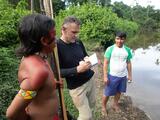Could Hurricane Eta be the "last straw" for Central Americans considering joining a migrant caravan?
SAN PEDRO SULA, Honduras - Twenty-year-old Andry Pacheco has never had it easy, but he never thought of leaving his country.
But now, after losing everything he owns due to flooding caused by Hurricane Eta, he finds himself homeless and often without food, he’s considering migrating for the first time.
“I hadn’t thought about it before because at least we had three meals a day,” said Pacheco, 20, seated on a bench outside the shelter where he’s staying in his hometown of San Pedro Sula. “But now with this situation how it is there are days we don’t eat. To get ahead of this crisis is going to be very difficult.”
Over 1.5 million people in Honduras were affected by the flooding caused by Hurricane Eta, which made landfall last week off the coast of Nicaragua as a Category 4 hurricane before passing through Honduras where it dumped as much as 40 inches of rain in parts. Several hundred thousand of the affected lost their homes and everything in it when floodwaters rose to the rooftops.
Along the main road from San Pedro Sula to the town of El Progreso, and in Puerto Cortes, many homes remain under water a week after the storm, or engulfed in thick, toxic-smelling mud mixed with debris, dead animals and sewage. Nearby sugar cane fields, an important local industry, are also under water.
Pacheco' father died when he was young and his family was so poor that he was forced to abandon his studies after completing only eighth grade and start working to support himself. Work has always been difficult to encounter and never provided for much more than three meals of rice and beans per day.
“Here life is really difficult and with this hurricane the situation is going to be worse,” said Pacheco, wearing a faded Darth Vader shirt and tattered, oversized jeans. “We’d risk going because in the United States there’s the advantage that a young person can work and do better.”
"The last straw"
Eta is the worst natural disaster to hit Central America since Hurricane Mitch in 1998, which was one of the most destructive storms ever and the second most deadly Atlantic hurricane in recorded history. In the years following Mitch, Hondurans migrated to the United States in significant numbers for the first time. Experts say that this latest crisis – which comes on top of the economic downturn caused by the covid-19 pandemic – will likely cause another spike in outward migration from the country.
“Often people migrate after a series of events causing loss of income, loss of crops, or threats and violence tips the balance towards fleeing the homes in which they would prefer to stay,” said Lisa Haugaard, co-director of the Latin America Working Group. “ This may be the last straw for people already on the edge. The flooding you can see in poor neighborhoods in San Pedro Sula, which is already the point of departure for many migrants, could spur migration, for example,” she added.
The covid-19 pandemic had already led to the loss of 300,000 jobs in Honduras and now with many businesses destroyed that number will grow even higher. Many who managed to survive by making tortillas or frying plantains had the equipment they used washed away and have no money to replace it. Farmers in more rural parts had their fields buried in the mud left by flooding or had their livestock carried away by the rushing current of the overflowed rivers.
Another caravan?
San Pedro Sula has been the point of departure for the migrant caravans that drew the ire of President Trump and provided a way for the poorest of the poor to migrate without having to pay a coyote. In the beginning of October, a caravan of several thousand people was quickly disintegrated after Guatemala closed its borders to the migrants just like other caravans had fallen apart before at the southern border of Mexico after that country withdrew the welcome mat under pressure from the Trump Administration.
Nevertheless, those who’ve now lost everything feel that they have nothing to lose by trying and there are already many calling for a new caravan.
“ A new caravan is already coming together on social media due to the current situation in the country,” said Karen Valladares, director of the Honduran migrant rights group FONAMIH. “It had been planned for January 2021, but after what happened there are already calls being generated on social media in which the people are planning a caravan in the coming days. There isn’t a specific date, but I wouldn’t doubt that it might leave near the end of November of the beginning of December," she added.
It isn’t clear whether the caravan that had been planned for January was tied to the inauguration of president-elect Joe Biden in January, but experts believe that the perception that the new administration will provide a greater chance for migrants to reach the US could lead many to think that the right time has come.
“It could be that it motivates the people to say that ‘with Biden you will be able to arrive,’ or ‘with Biden they will give us legal support,’ or ‘with Biden we will be allowed into the United States when our lives are in danger,” said Valladares.
As president, Biden has pledged to "do away with the Trump Administration’s draconian immigration policies and galvanize international action to address the poverty and insecurity" driving migrants to the United States. His plan for Central America envisages "a comprehensive four-year, $4 billion regional strategy to address factors driving migration."
Mexico now a migrant obstacle
“Every time that people suspect that there's going to be a change, that things are going to open or close, it affects people's timing,” said Stephanie Leutert, director of the Central America & Mexico policy initiative at the University of Texas.
So long as the pandemic continues, however, travel restrictions will continue to make it difficult for caravans or individuals alike to migrate. And even with Trump out of the White House, Mexico’s president Andres Manuel Lopez Obrador – who when he first took office welcomed migrants with open arms – is unlikely to reverse course in terms of his country’s migration policy.
“I don't think he's taken a political hit that would create a backswing in policy,” said Leutert.
In the year before the pandemic, more than 250,000 Hondurans were apprehended at the southwest US border – more than double any previous year and the equivalent to roughly one in every 36 of the country’s citizens. Many more made it across the border undetected or applied for asylum.
Lack of aid
The spike in migration following Hurricane Mitch continued for several years. This time, the country is arguably in a worse situation then it was then but whereas the international community quickly mobilized billions in aid after Mitch, so far little aid has materialized as countries are dealing with their own financial problems from the pandemic.
The Salvadoran government of president Nayib Bukele has sent 120 trucks of food to Honduras and Guatemala.
With the Honduran government unable to rebuild on its own, hundreds of thousands of Hondurans who literally have nothing to lose and little to no reason for hope of change in the near future, there could be a new record set for outward migration from the country in the coming years.
“What am I going to do here,” said Pacheco. “The situation is critical.”
He’s not deterred by the dangers along the migrant trail or the obstacles that governments might put in the way.
“It’s risky,” he said. “But sometimes you need to risk even your own life to be in a better condition.”



